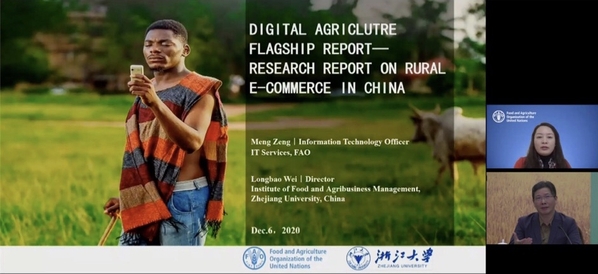ZJU and FAO co-hosts Digital Agriculture Forum 2020
The Digital Agriculture Forum 2020 was co-hosted by the Food and Agriculture Organization of the United Nations (FAO) and Zhejiang University on December 5-6. Aiming to foster an enabling ecosystem to accelerate the digital transformation of agri-food systems, it was composed of three main events: the Global Agrilnno Pitch Event, the Digital Agriculture and Rural Development Forum, and the Digital Agriculture Dialogue.
More than 300 people out of 900 registered from over 80 countries participated in the two-day webinar for knowledge sharing and mutual learning. Over 30 international leaders and distinguished speakers delivered speeches and presentations, including Ms. Beth Bechdol, FAO Deputy Director-General; Prof. Ismahane Elouafi, FAO Chief Scientist; Mr. Dejan Jakovljevic, FAO IT Services Director; Mr.YE Anping, FAO South-South and Triangular Cooperation Division Director; Mr. LIU Jian, Chairman of the National Agricultural Science & Technology Entrepreneurship and Innovation Alliance of China; Prof.ZHAO Chunjiang, Academician of the Chinese Academy of Engineering; Mr. WANG Xiaobing, Director-General of the Information Center of the Ministry of Agriculture and Rural Affairs of China; Prof. HE Lianzhen, Vice President of Zhejiang University.
“We hope this event could provide a mutually beneficial environment to enhance the knowledge and practice exchange on digital innovation, rural revitalization and digital agriculture, find innovative, inclusive and sustainable solutions, facilitate policymaking and international partnership, and improve the digital transformation of agri-food sector,” said Prof. HE Lianzhen in her welcome remarks.
Highlighting some of FAO’s digital initiatives such as the Hand-in-Hand Initiative and the 1000 Village Initiative in the opening speech, Prof. Ismahane Elouafi welcomed everyone to join FAO’s efforts in Leaving No One Behind through sustainable, inclusive and resilient food systems for better production, better nutrition, a better environment, and a better life.
Mr. Wang Xiaobing shared China’s approaches and experiences in digital agriculture and e-commerce transformation for its rural communities. In recent years, China has made enormous efforts to promote the integration of the Internet, big data, artificial intelligence with the development of agriculture and rural areas.
The Global AgriInno Pitch Night was the first event that kick-started the Digital Agriculture Forum. A total of 12 teams (from Australia, Bangladesh, Bolivia, China, Jamaica, Liberia, Nigeria, Spain, the United States and Uganda), selected from 172 applications from 35 countries all over the world, pitched their solutions to a jury composed of 6 international scientists and experts of the digital and innovative agri-food sector. After a fierce competition, Aquafarms, a new hybrid entrepreneurship project of soilless culture and aquaculture, jointly developed by Liberian and American researchers clinched the first prize; the “Digital Beekeeping Project” and the “Mi Terro”, a food protein extraction project from China won the second prize. The “Vertical Green” strawberry producing project, the “Sumatja Mikiuaa” fruit and vegetable supply project, and the ”Nampya Farmers Market” food e-commerce project of three entrepreneurial teams respectively from Spain, Bolivia and Uganda were awarded the third prize. Addressing the youth-led innovation teams, Ms. Beth Bechdol concluded, “I hope each of you feels encouraged and inspired to continue solving outstanding problems that you are helping to be considered as part of the world’s biggest challenges. I am incredibly impressed by your smartness, passion and courage to start a business that will bring real impact to people who have real needs today.”
At the Forum, ZJU and FAO jointly released the first “Digital Agriculture Flagship Report”, which systematically elaborates on the current development status of China’s rural e-commerce from the international perspective. By analyzing the characteristics and operation of two typical models—the traditional e-commerce platform and the social media platform, it explains the primary reasons for the successful development of China’s rural e-commerce and examines the policy, challenges and trends.

